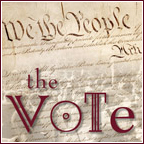ELECTION IRREGULARITIES: Louisiana Democrats Disenfranchised When Party Registration Switched
The presidential campaign of Barack Obama has issued a statement regarding reports of voter-registration irregularities in Louisiana that allegedly led to the denial of the vote to hundreds of people. The Obama campaign website published the following:
The Obama campaign submitted an urgent request for assistance to the Secretary of State’s Division of Elections today, after receiving widespread reports from Democrats across Louisiana who reported that they were not allowed to vote because their party affiliation had been switched. Hundreds of Louisiana democrats went to the polls to vote in today’s presidential primary and found that they were now on registration lists as Independent or Unaffiliated voters.
The outcome of the voting in Louisiana appears to be a win for the Illinois senator, but his campaign has been vehement in pushing for greater access to the polls for would-be voters, and took issue with the manner in which voters' party registration was allegedly switched without their knowledge.
The investigative blogsite, Bradblog, has published this summary of a wave of irregularities in the primaries held in recent days:
Georgia: Widespread bottlenecks for voters as problems occur with Diebold's new e-pollbook system and the state's new Photo ID restrictions. Voters waited in line for up to two hours in some places.
New Mexico: 17,000 (11%) forced to vote on provisional ballots in Democratic Caucus as previously registered Democrats find they are no longer on voter rolls recently privatized by voting machine company ES&S.
Arizona: We've begun receiving reports from voters and local officials of polling places where some 40% of voters were forced to vote on provisionals, after state registration system outsourced to ES&S. [UPDATE: One such report is now published here, from a poll worker who reports that of 1291 ballots cast at her polling place, 540 --- some 41% --- were forced to vote provisionally.]
California: Various reports of voters registered for one party to find they were switched to another, or not registered at all. Confusion about how to handle non-partisan voters in Los Angeles County leads to nearly 100,000 votes which may not be counted properly.
Problems with electronic voter-registration records, with the management of these systems by private contractors, and especially where non-verifiable touchscreen machines have been used —leaving no physical record of voter intent, only a potentially (and in many cases to date proven to be) flawed electronic "tally"— are occurring in a disturbingly high number of places, and irregularities are already threatening to undermine the overall integrity of the 2008 election process across the United States.
- Brad Friedman: "Obama Camp Sends 'Urgent Request for Assistance' to Louisiana SoS as Voters Find Party Registration Switched"
- VotersUnite.org: "A non-partisan national grassroots resource for fair and accurate elections"
- Freedom's Phoenix: "To Arizona Voters & Ron Paul supporters... a story from inside the Election Process by Jeneen Zucker"


















